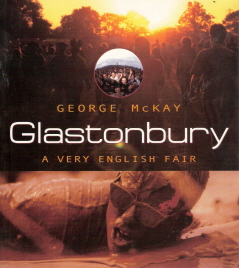Glastonbury: A Very English Fair (London: Gollancz, 2000)
A way to explore things is through George McKay’s Glastonbury: A Very English Fair…. As McKay explain straightaway, his focus on Glastonbury is also to bring out a wider movement that he discusses as ‘festival culture’. An important part of his book sketches out a ‘time-line of festival culture’…. [T]he theme of generating active participation in some sort of organized spontaneity—Durkheim’s ‘an organized tumult is still a tumult’, echoed in McKay’s ‘anarchy and control’—runs through his whole account of the ideals, issues and tensions that help to constitute what is essentially an anti-establishment festival culture…. William Watts Miller, A Durkheimian Quest: Solidarity and the Sacred (2012, p.212)
Everything you hear, taste, touch and feel at the modern-day rock festival owes a substantial debt to the Pilton Pop, Blues and Folk Festival, as it was first known 40 years ago. In his authoritative book, Glastonbury: A Very English Fair, author George McKay got it in one when he wrote that the festival was “an arena for idealism, anarchy, being young, getting old disgracefully, trying to find other ways, getting out of it, hearing some great and some truly awful music”. Brian Boyd, ‘The National Trust stages a rave’, Irish Times (June 18, 2010)
George McKay’s detailed and otherwise exemplary Glastonbury: A Very English Fair is only tangentially concerned with the fact that, somewhere in the complex socio-political matrix he describes, a band on stage are playing. David Pattie, Rock Music in Performance (Palgrave, 2007, vii)
George McKay has provided a helpful ‘Time-line of Festival Culture’. Christopher Partridge, ‘The spiritual and the revolutionary’, Culture and Religion (2007)
[A]n energetic tumble through the history of twentieth–century English festival culture … it is the story of strange and often contradictory bedfellows. Blue blood meets the blues. Political radicalism meets medieval fantasy. Land reform meets enclosure. In the end, the book becomes a juggling act, with all these ideologies flying through the air. We have punk cynicism, anarchist materialism and academic scepticism—three forms that are at least of similar shape and size, and which, you feel, McKay should be well practised at manipulating. But it is as if someone has thrown him a chainsaw, then a burning wand and a raw free-range egg in quick succession; hippie madness, from ley lines to Arthurian romance, from numerology to pyramid stages, proves difficult to balance. Does he manage to keep up the act without getting egg on his face? Well nearly. C.J. Stone, review in Times Literary Supplement (18 August, 2000)
[A]lso contains a well-illustrated … history of alternative festivals dating back to the 1950s, when a few Communist Party literary types decided to start an event that we now know as the annual Edinburgh Festival [fringe]. Review in Tribune (4 August 2000)
For today’s kidz it might seem quaint for McKay to elaborate on “the importance of post-1960s festivals to ongoing radical protest” or even “to position festival culture within a political praxis and discourse” … but even the most apolitical dot.com-share-holding, Nokia-wielding adultescent who thinks “Revolution” is a song used as the soundtrack for a Nike ad, would find common currency in McKay’s finding that festival culture is “a politics which admits pleasure, pop and rock music, temporary community, landscape, nature, promiscuity and narcotic”. Brian Boyd, review/feature in Irish Times (p. 14, 27 June 2000)
Aside from the toilet roll, the ear-plugs and all purpose liferaft, every Glastonbury pilgrim should have a copy of George McKay’s Glastonbury: A Very English Fair in their rucksack. Simon Evans, review in Birmingham Evening Post (24 June 2000)
The cumulative effect [of the book] is simply to make you want to be there, no matter how smelly, overcrowded or over-priced the festival is. Katrina Dixon, The Scotsman (23 June 2000)
The definitive history of the Glastonbury Festival…. Great photos. Books Magazine (May 2000)
A compelling read…. A generously and lavishly produced book, including an extensive ‘Time Line’ tracing the history of Glastonbury and festival culture year by year in immaculate detail. This is an exciting new publication. Bruce Garrard, Free State: The Journal of the Free State of Avalonia (Lughnasad 2000, issue 10, page 18)
McKay looks at the festival’s past in words and images, posters and pop [in]… a colourful guide to Britain’s alternative summer culture. Lisa Baxter, Ipswich Evening Star (24 June 2000)
Thorough, readable and remarkably wide ranging, whatever you want to know about Glastonbury et al you’re sure to find it here. Philip Horton, review in Bath Chronicle (24 June 2000)
AMAZON.co.uk Book of the Week! 27 June 2000
An account of Glastonbury as representative of the whole festival culture. Sunday Times, Culture supplement (26 June 2005)

